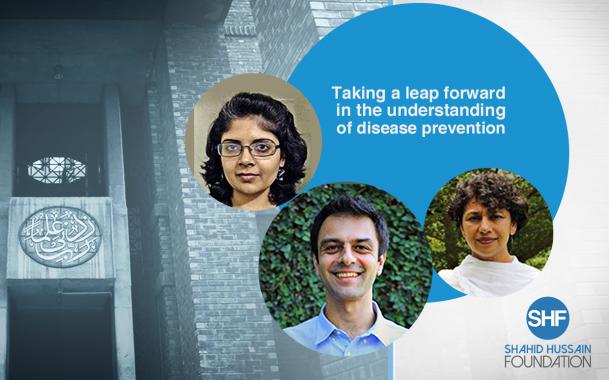
The Shahid Hussain Foundation (SHF) recently announced the selected projects under the Public Health Research Grant 2018 (PHRG) of PKR 4 million. Three teams from LUMS have won PKR 3 million in grant awards. These were led by Dr. Agha Ali Akram, Department of Economics and Dr. Sameen Mohsin Ali, Department of Humanities and Social Sciences (Political Science), housed at Mushtaq Ahmad Gurmani School of Humanities and Social Sciences and Dr. Shaper Mirza, Department of Biology at the Syed Babar Ali School of Science and Engineering.
SHF, a Lahore-based organisation working to support education and health access in Lahore, launched the Public Health Research Grant 2018/19 to support innovative research in Pakistan. This was an exciting research opportunity for multi-disciplinary academic and professional teams affiliated with LUMS and/or Shalamar Institute of Health Sciences (SIHS) working in the subject of public health, health policy, and socio-economic research.
LUMS proudly worked in collaboration with the SHF as it envisions to be a research university dedicated to serving society through world-class education and social responsibility. The SHF Grant was definitely a unique opportunity for both partners to work together in this collective mission to serve the people of Pakistan and work towards a thriving society with improved health outcomes, life expectancies and disease prevention.
The LUMS faculty-led selected projects for the PHRG 2018 following a competitive application and review process included: “Understanding Pakistan’s Immunization Problem: A transactional approach” by Dr. Sameen Mohsin Ali at LUMS and Dr. Samia Altaf; “Investigation of hyperglycaemia mediated inflammation on risk of cardiovascular disease in type 2-diabetes”, a collaborative research project by Dr. Shaper Mirza from the Department of Biology, LUMS and Dr. Bilal bin Younas from the Diabetic Center, SIHS and “A randomized controlled trial to assess effectiveness of the in-home Growth Monitoring Tool (GroMoTo) in addressing childhood stunting,” another collaborative research project by Dr. Agha Akram Ali at the Department of Economics, LUMS and Dr. Hina Khalid at ITU.
Dr. Ali, PhD in Politics from SOAS, University 2018 with teaching and research interests in patterns of bureaucratic appointment, electoral and party politics, election management, and the bureaucracy's interaction with the legal system said, “My co-PI Dr Samia Waheed Altaf (Affiliated Research Fellow, Dean’s Office MGSHSS) and I wish to thank the Shahid Hussain Foundation for this grant to investigate both the supply and demand sides of the immunisation problem in Punjab. We hope to understand not only the reasons for vaccine refusals in our selected districts but to provide a fine-grained analysis of the planning and implementation, successes and failures of immunisation policy.”
Meanwhile, “This grant opportunity will allow us to explore an important relationship between diabetes and heart disease. Using a multidisciplinary approach our goal is to understand how inflammation, a characteristic of type 2-diabetes lead to heart disease. The study will identify biomarkers that will be used for developing therapies to reduce inflammation thereby reducing the risk of comorbidities, such as heart disease in type 2-diabetes”, commented Dr. Mirza, a recognised researcher in the areas of molecular pathogenesis and author of several papers in high impact factor journals.
“We are delighted to have been selected to receive this grant. Our research will try to understand why so many Pakistani children are stunted. Specifically, we will look at the role of providing caregivers in resource constrained settings information on their children’s growth trajectory, i.e. child anthropometric information, such as weight for age and height for age, on child anthropometric outcomes. We are testing our hypothesis with a randomised controlled trial in an urban slum setting in Karachi,” said Dr. Akram on the grant.
The Research Grant is a unique effort to undertake projects with local funding, comprises of local research teams and experts, and conducts research within Pakistan (local subject). This in an effort to foster a culture of localised research and learning, to provide an understanding of the complexities within the Pakistan health sector and offer viable solutions for a strong and sound health policy.
The areas of research for this grant included, social determinants of health, healthcare and health promotion among vulnerable groups, time-series analysis of lifestyle choices and onset of diabetes, BP and heart disease, urbanisation and health, new approaches to understanding and reducing infectious diseases in Pakistan, health leadership – decision-making and autonomy in Pakistan’s healthcare and heart-disease and blood pressure - trends in Pakistan.








